Comments
-
The US Economy and InflationAn insightful and interesting interview with Jeffrey Sachs. I think Sachs puts the "doom & gloom" into a reasonable perspective.
As Sachs points out, Ukraine could easily see hyperinflation because of the war.
As the war against Russia enters its seventh month, Ukraine is stuck between a financial rock and a hard place as it seeks to stay afloat while fighting off Moscow's invading forces.
Tax revenues have plummeted due to an economy in free fall while military spending has skyrocketed, leaving the government facing a budget shortfall of $5 billion (€5.02 billion) per month.
To make up for the lack of cash, the country's central bank has effectively been printing money — buying government bonds to the tune of $7.7 billion over the past six months. The Financial Times reported that the printing presses effectively created $3.6 billion in June alone.
Inflation in Ukraine is now about 20% and is going to 30%. The Baltic States have endured high inflation too in the euro area:

-
Ukraine CrisisIt is interesting to see how the Ukrainian counterattack goes. The simple fact is that even with military aid they have gotten, they don't have enough resources for a full on Materialschlacht, a battle of attrition. Counterattacks sooner or later go into this.
-
Ukraine CrisisWow. Now that would be a dramatic move. But after this we haven't anything new about this, I guess.
I remember that Morocco offered cavalry to Finland during the Winter War. Yet the Moroccan cavalry didnt come to fight in snowy Finland.

-
Ukraine CrisisWhy should hatred be morally right? — baker
In some occasion, people do understand why someone would have this feeling.
If someone kills your family and other loved ones, is it morally wrong to hate a person for this action?
Heck, if you would say that hating Donald Trump is morally wrong, many here would disagree (I presume). -
Quantitative Ethics?With something quantitative you get people doing quantitative measurement. That is something people simply do. You don't get just an answer of one action being more ethical than another, but just how much "more ethical" it is. And their obviously should be an agreement just what is more ethical than other.
Yet many times we simply just want to choose "the most ethical" option, which depends on many things, starting from our World view and our understanding of the issue at hand. Which may differ from others as many issues are very complex and the most ethical option can be under debate. -
Quantitative Ethics?
Well, if you are unethical or try to be something you aren't, then I guess looking for brownie points and measuring ethical conduct as a performance sport might be the way to go.On a general level though, measuring ethics and ethical behavior on some kind of scale looks very difficult if not impossible. Isn't that right? — Alkis Piskas -
Ukraine CrisisHave to look the articles.
I think that both sides did break the so-called cease fire. Before the February 24th assault, the Russian artillery intensified.
As a Finn and as an European I just point out to my Mexican (Latin) wife that my skin is darker than hers. That's how stupid the whole race thing is.:up: We're all African apes. If someone discriminates personally prejudicially by shoe size, place of birth, freckle count, melanin pigmentation, or some such, then they're a racist (and that's meant as an insult). — jorndoe -
Sanna MarinI don't think that she's going to be ousted.
Basically the opposition understands that attacking Marin now can end up damaging them and they can just wait for the oncoming recession, the high inflation and the energy crisis simply to take it's toll on the leftist/centrist administration. This "partygate" is still this kind of non-important issue when there are far bigger political problems around.
So I think she has avoided already this scandal. American politics concentrates far more in these kind of issues especially during elections. Finnish political discourse is still "boring" and concentrates on politicy issues.
Actually, she has said that she's not going to run for the Presidency. Which of course can change. (Like just before Putin's 24th Feb invasion she didn't see NATO membership happening)
After being put into the PM position (when the previous Social Democrat PM had to resign after his scandal) like Liz Truss and then surviving COVID pandemic and joining NATO and now being the most famous Finnish politician, I think it's likely that she might become the Finnish President someday.
(If the wild sex party tapes don't surface, that is! :wink: ) -
Ukraine CrisisI don't think it was a typo from @Olivier5 (but I could be wrong, of course).
Well, I'm not sure just when Russians weren't Russians. Or the time when Ukrainians weren't slavs (Ruthenians were considered slavs too). It's not as we Finns have been Finno-Ugrian and before weren't, but I guess with enough time we all trace back to Africa. -
Joe Biden (+General Biden/Harris Administration)Should we expect impeachment of ≈ every president onwards? Future statistics going by least impeachments? Hopefully not. — jorndoe
It might go their. Also persecution of Presidents after their presidency is over. (If you think it will end with Trump...) -
Ukraine Crisis
I don't think they are slaves, and haven't been for a long time. Sometimes you are just in a country where politics doesn't work so well as in other countries and you don't have democracy, rights of the individual and a justice state. Mexicans are nice people, but their government is terrible. I would say the same thing about Russia. We should remember that our countries could also lose our democracy if everything would go to hell in a handbasket. And then we are just awed how insane our society has become and how crazy our fellow citizens are.I think that as far as Slavic people go, Ukrainians are better than Russians. The latter have always been slaves. — Olivier5 -
Ukraine Crisis
Why would any hatred of a large people or a country be morally right?Why should the Western hatred of Russians (and Slavic people in general) be considered morally right? — baker
I think you should judge individuals by their actions. Regimes can be totalitarian or undemocratic, but why the hatred, especially of large people, be they American or Russian or anybody else? There's a lot of different people among them.
In wars some people find it easier to really hate the enemy. And of course personal experiences and those to your fellow people makes it totally understandable. Personally I don't have anything against Russians, I know that many of them don't at all support Putin, and some naturally do. I'm just not in that hating game. It's for the racists and xenophobic people. -
Sanna Marin
As an old saying goes, everything is fine "up to a point". Perhaps it's that there are many videos.Why did she do that?
If partying and drinking are so great and make her so capable of ruling her people, then why apologize for partying and drinking?? — baker
Actually, she didn't apologize, but made a tearful statement (with translation in English.)
Because she had done that already. Far before the last round of partying, when the first criticisms of her partying emerged. Then she had that defiant response.Why didn't she say something like, "Yes, I'm a Prime Minister. Yes, I party. Yay!" ? And perhaps throw a "Deal with it!" in the mix. — baker
Then she had sent to her critics sent an instagram (along with friend MP in the background dubbed "party-Ilmari") below:

It basically says "boomers, just chill out". It's part of lyrics from a Finnish pop song and refers to the older generation we know so well.
I think she is just has learnt that the old rules apply and are useful.If she wants to be a politician of a new era, then she should behave like one consistently and play by the new rules, not the old ones. — baker -
Ukraine CrisisI think the feeling is mutual with the Slavophiles in Russia.
They haven't ever liked the West and especially they haven't liked the westernizers, the Zapadniks. The divide goes far into history in Russia.
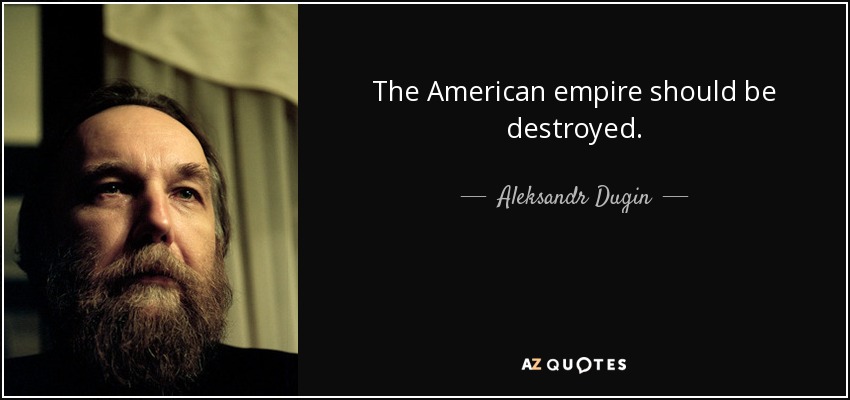
-
Ukraine Crisis
Except that usually arms are sold. Not given. That's the real difference here.That's not "standing" with someone, it's supplying arms. — boethius
So I don't understand what your point is with this kind of rhetoric.
Poor, poor Russians. Threatened by Nazi's.Because there's an important port in Sevastopol which an anti-Russian government supported by literal Nazi's would threaten, and Crimea was Russian not long ago and is filled with ethnic Russians. — boethius
I guess that Sevastopol base is the reason to start a war in the Donbas too. By denying the obvious imperialist aspirations of Russia, your position is quite clear. -
Ukraine Crisis
Except giving military and financial aid to Ukraine. Which actually rarely happens.Again, no one is actually "standing" with Ukraine, except a few foreign fighters. — boethius
We see statements like this, but never see any evidence. — boethius
How isn't the ANNEXATION of Ukrainian territory clear evidence of this?
Or the Russification that Russia is doing in the occupied territories?
Or simply just what Vladimir Putin says?
How simply that isn't obvious evidence??? -
Climate change denial
There's a huge difference on what kind of subsidy one wants for a negative outcome than with the tax one would pay for there be no negative outcome.people respond better to subsidies than taxes, no surprise there but there's still a majority for making sacrifices also in the form of taxes. — Benkei
Far better is to give incentives for the industry and for the needed infrastructure to be created for electric cars (starting with having that electricity demand met without new or existing coal plants).
Furthermore, just notice that actually older cars don't run on present day fuel sold in gas stations. So the timeline basically for cars to transform happens in many decades.
Far too many times policies are done that sound good, people think our needed, but simply don't have any trace of reality in them. As if they really would want to face an economic recession, blackouts and lower standard of living than before. Just as one historical example: after the Three Mile Island incident, Sweden decided after a referendum in 1980 to go away from nuclear energy. The Parliament decided that nuclear energy production would be phased out by 2010, hence in thirty years. In 2010, Sweden was producing far more nuclear energy, both in power and percentage wise, than in 1980.
Nearly one third of electricity in Sweden is produced by nuclear energy in Sweden today, 42 years after that decision.
So one can basically fuck off with 90% of the bullshit energy policy initiatives which sound good to people, won't happen and will be forgotten when the next administration comes in. And that's why basically many countries don't have a real energy policy. It's all just nice words far from the actual reality.
(Sweden before Greta. Nuclear was bad even then.)

-
Climate change denial
Wouldn't the question about be poor people, not the rich people that can afford brand new electric cars?So people are prepared to do this, provided rich people are under the same ban. — Benkei -
Ukraine CrisisRussian fighter Igor Mangushev tells what he thinks about the goals of the war, with a skull of an Ukrainian soldier as a prop:
-
Ukraine Crisis
:smile:Why not? Do people just flee to the Eurasian steppes and live with camels to escape the draft?
Bu
Or do they dress like Cossacks and get so drunk their hearts stop beating?
I'm very familiar with Russian life, as you can tell. — Tate
Well, people just evading authorities and moving into the forest is said to be one reason why Russia didn't have similar feudalism as in Western Europe.
But I guess the reason is that a) you can bribe the officers that are responsible of your draft, b) you can bribe a doctor (like Trump did to avoid military service in Vietnam) that you are unable to serve or c) you just don't show up and the government doesn't have the resources to hunt for every draft dodger there is. Or then work on an important sector (like information technology) where your employer can get you exempted.
Russia on Tuesday temporarily exempted young IT workers from military service after an exodus of programmers following Moscow's military operation in Ukraine.
That not all of able males do serve has been a problem in Russia for a long time:
(from 2015)
in Russia, military service is mandatory for men aged 18 to 27. But according to a recent European Parliamentary Research Service report, each year, half of all would-be conscripts—75,000 out of an annual intake of around 150,000 young men—are thought to be dodging the draft.
Now it is said that the drop out rate is only 30%, so basically the situation has improved from 2015 I guess.
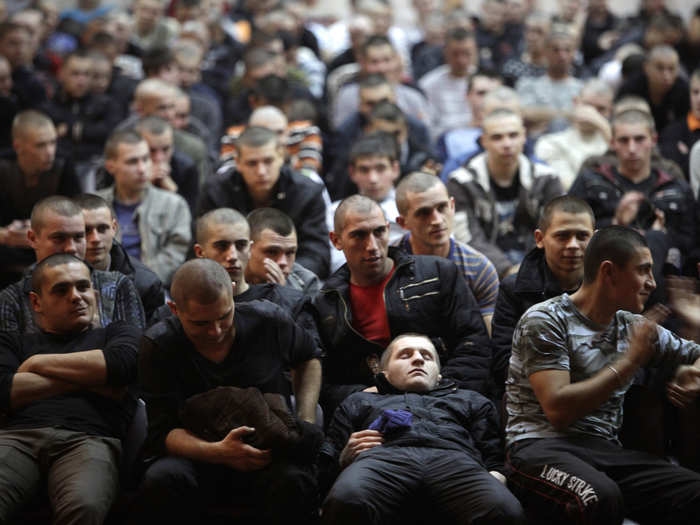
-
Logic of truth
By logic, do you mean first order logic?Not sure. The logics here are an attempt to make these issues clear. — Banno
To me it seems like one takes the natural numbers and then assumes you can deduce from the natural numbers things like infinity or irrational/transcendental numbers. Doesn't go like that.
But perhaps first a question that someone hopefully could answer:
Tarski's indefinability theorem and the Incompleteness theorems of Gödel are in some literature called as incompleteness results. Are they equivalent or just how they link to each other? For me it seems like talking about the same issue just from a bit different viewpoint. Am I wrong? -
Logic of truthOne thought, hopefully adequately understandable:
What if our premisses are wrong when we try to make a theory of truth as we try to do it?
That we just assume it's a straight forward logic "if...then" as we ordinarily do. But self-reference, or generalizing to all possibilities and we end up in problems where we need a metalanguage or some hierarchical system to avoid a paradox.
And the wrong premiss is that when we add self-reference, or the infinite, our finite logic simply cut it? And this is what the paradoxes tell us. -
Ukraine Crisis
There is a very interesting longue durée in the way Russia works it's imperialistic goals. The methods and tactics are basically same. From Putin's speeches the historical viewpoint is evident, something that rarely Western politicians use, but is very common for example in the Middle East.The disastrous Winter War that preceded this didn't discourage the Soviets - and the gamble payed off. They installed puppet governments, which promptly held "elections," followed by a vote to become new Soviet Socialist Republics (with 90+% voting in favor).
So yeah, they've learned all the wrong lessons from history, if they learned at all. — SophistiCat
Meanwhile, Putin is trying to enlargen the armed forces:
Aug 25 (Reuters) - Russian President Vladimir Putin signed a decree on Thursday to increase the size of Russia's armed forces from 1.9 million to 2.04 million as the war in Ukraine enters its seventh month.
Moscow has not revealed any losses in the conflict since its first weeks, but Western officials and the Kyiv government say they number in the thousands.
The increase includes a 137,000 boost in the number of combat personnel to 1.15 million. It comes into effect on Jan 1, according to the decree published on the government's legislative portal.
Even in the spring draft the objectives weren't met. So easier said than done. -
Sanna Marin
In Kekkonen's and Koivisto's time yes, but in the 1990's the tabloid press started to be "normal" even in Finland by European standards. For the last thirty years they would go for the jugular when these kind of pictures / videos come out. And now, in our time, the "old media" just has to respond what already has happened as is already discussed in the social media.My woman friends claim it wouldn't even be an issue if it was a male politician. — boethius
Without the social media I think that there would be just these rumours going on that Sanna likes to party without anything been written about it in the media.
Many Finnish men have a "personal problem" with alcohol.There's a bunch of examples of male politicians getting blackout drunk on official visits and so on, but my counter-point is they weren't Prime Minister, but things like cultural minister (representing Finnish drinking culture). — boethius
The best example of this was Ahti Karjalainen, who made a stellar career starting from being the secretary of President Kekkonen and the Soviets (KGB) wanted him to follow Kekkonen. But alcohol got him. Those times once when on a state official visit in Finland the motorcade suddenly stopped and the reporters jumped out to find out what's happening, nobody took a picture of the intoxicated Finnish foreign minister throwing up next to the car carrying him. So he was put away into the Central bank of Finland. And as an alcoholic, even got fired from there.
I'm not sure just how well that "boys will be boys" thing will go in the post me-too environment. You have to be a Donald Trump: have firm backing from your supporters that think everything you do is great as you irritate the elites and everything bad thrown at you is just fake news.However, a male getting drunk and frisky at a party I don't think would be automatically interpreted as cheating. Easily have a "boys will be boys" narrative around it, but I do agree the leaving your wife alone with the child to go party would be viewed as classic douche archetype ... but that's not necessarily so damaging politically. — boethius
Sanna's supporters aren't so many as she isn't an anti-establishment populist. -
Ukraine Crisis
I remember when they studied the effects of WW2 on children in Finland, they found that the most traumatic experiences were with those children that were evacuated to Sweden and were separated from their families and parents. No civilians were left to the hands of Russians as the civilian population was evacuated from front. At least now it has been mothers with their children that have been evacuated from Ukraine.Over half of Ukraine's children are now refugees or fleeing (some more or less kidnapped), with no light at the end of the Ukrainian tunnel.
As seen before, a generation could be lost, while Putin's machinations bomb away, allegedly to deNazify and/or out of fear of NATO.
The right thing to do in the immediate term would be for Putin to turn the volume down, simple as that.
So far, UNICEF et al arranged for schooling/education for some 600,000 children having fled Ukraine. — jorndoe
(Not like this...)
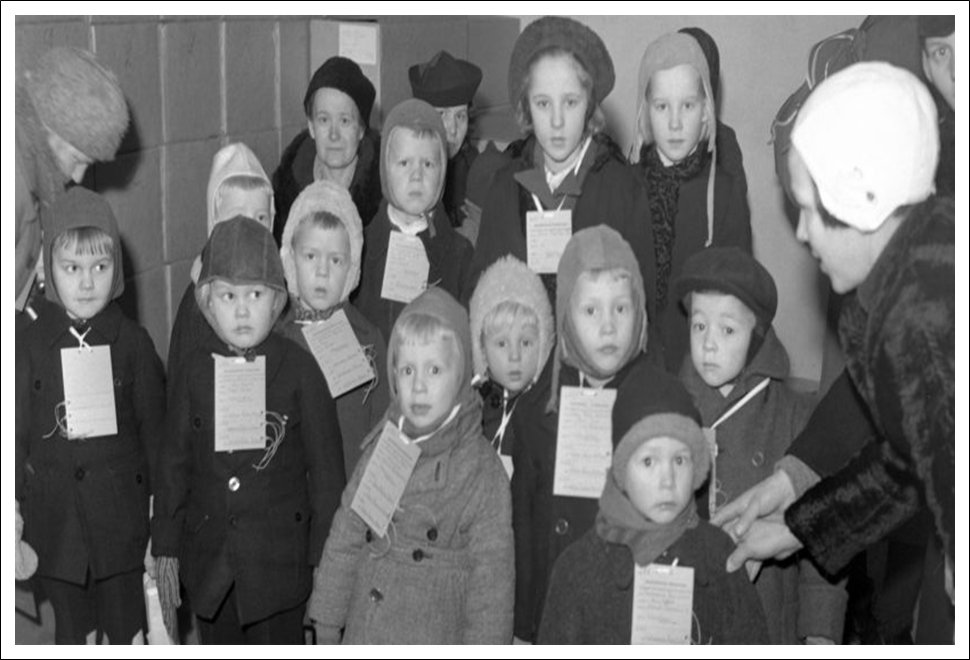
(Better like this for the child.)
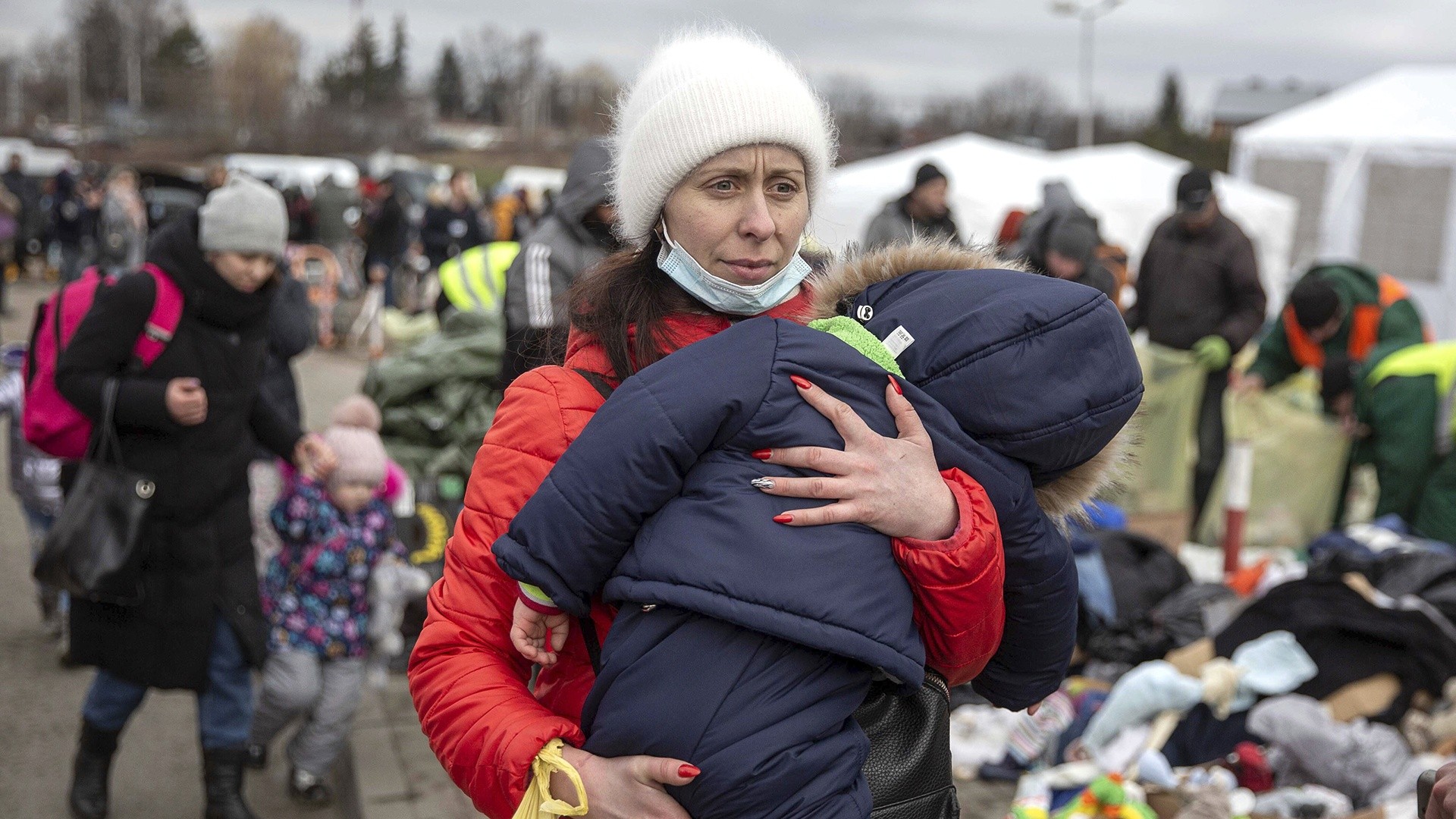
And with this rate, likely about 100 000 or over will be killed in the first year of the war. -
Sanna Marin
I think you are correct.About time you showed up :wink: . Her image has been severely undermined and so, I think she's effectively finished. And she probably knows that. Hence the tears. It's not a moral issue, and nothing she did is inconsistent with being a top class PM. It's just the image. The "Prime Minister" is that thing in our head we consider Prime-Ministerish and for most people that has certain boundaries. We don't want the human getting in the way. We'd rather brush that under the carpet. Her sin was letting her human out there in full HD vid, so we can't. Ergo, she's toast imo, though she'll probably limp on for a while. — Baden
Anyway, elections are held in 2nd of April next year and likely this administration will limp forward until there. I don't think that she will resign before (I may be wrong, of course). The social democrats got a breath of fresh air with the now 36-year old Sanna (as the average age of the party members is over 70), Yet high inflation, the likely economic downturn and the oncoming energy crisis will likely mean that the conservatives/True Finns may possibly win. (Actually the conservatives lost only because a popular member of parliament created a offshoot party once he didn't get a top ministerial post when the party was in power. Basically something similar to when Ross Perot undermined Bush the elder and Clinton got into power.)
But I have to say that she had been a smart politician, before choosing the wrong "in"-crowd of assholes among whom to party with. She was firm on issues like NATO membership and COVID-restrictions once the strong majority of the people felt the same way. She changed her views quick enough to take on the role of being in command. Above all, all those crappy "lose-or-lose more" issues that any administration has to face and cannot win, suddenly an another minister would to take the hotseat and she wouldn't be anywhere around to take responsibility. That tactic actually worked well: if the shit stuff is commented by others and you comment on the "good" stuff, things that people agree with, people will have a positive image of you. Until you give it all away some party celebs that live off from instragram fame.
The only issue I really have, and yes, I am indeed old fashioned because of this, is that at least I haven't noticed the PM partying with his husband. Her husband is n ever mentioned in the parties. The males in the partying buddies are just other "friends" of Sanna. But hey, she celebrated their anniversary with her husband so I guess it's OK. An open style marriage I guess. Or then it's a show marriage because some more old fashioned/conservative people here might think a PM should be married and not have out of wedlock children. If your a single mom, then proudly be a single mom.
I just think that if it was an 36-year old male prime minister partying with women celebs and nowhere would be his wife that he has been married two years ago and with whom you have 4 year old daughter with, people wouldn't be so accepting. Usually marriages in which the spouses don't party together won't last.
But anyway, so why did she fuck up so big?
I think that for this once a supermarket cashier (which fits perfectly the social democratic image of rising from an ordinary background), the superstardom she got as this young sexy prime minister simply went to her head. Usually a Finnish prime minister, even if female, doesn't get the limelight as Marin has had now. And things like joining NATO naturally put our country into media focus. Above all, last year when the first partying videos emerged from the prime minister's official residence, her polls did actually go up. Because then it really was just about singing and dancing. And it was a meeting with artists. And naturally pop artists sing and dance. So if the polls went then up, why not simply continue to party! -
Sanna MarinHAHAHAAAA!
Four pages already of our PM. :razz:
Well, Sanna basicallty jumped to this immediately. I think only some opposition politician tweeted that she should take one. And that's it. The media wasn't asking for it. And she took a pee test, which umm...shows if you have had drugs during the couple of days.But actually it's pretty crazy that a highly succesful woman, who also happens to dance well, is forced for political reasons to take a drugtest. — Benkei
Well, as nearly unavoidable (as a Finn) I've seen the videos...and the discussion here. The things that made this fuzz about drugs was because:
a) someone in video referred themselves who party as "jauhojengi", flour-gang which is urban slang for people who use cocaine etc instead of alcohol
b) in a video there seems an absence of alcohol bottles and in one shot in the kitchen shows a white stripe on the table (which of course could be everything).
c) the videos were shot before they actually went out in two clubs and partied until five.
d) this isn't the ONLY time these partying videos have gotten out. I think last year was already was video of Sanna partying with artists (many the same group).
I think the general consensus is that the whole debacle just questions her judgement about the friends she has. And of course, if it would be a male PM, however good looking, he would be out. I think just a photo of a male intimately dancing with a female singer when his wife and daughter are at home would be enough. Nobody would believe the "we're just friends" answer.
(Some of Sanna's friends using the prime ministers residence information room to get cool photos. She first tried to say the pictures were taken at the toilet. Notice the same "Finland" sign and Sanna himself has acknowledged that they are genuine, which she regrets.)

Well, she wanted to "shake the institution of the prime minister". That she definately has done. :snicker:
But now we are here in the phase where she apologizes with nearly breaking up in tears ...and telling that Ukrainians have it worse. Which is true. And it's the Ukrainian day of independence, I think.
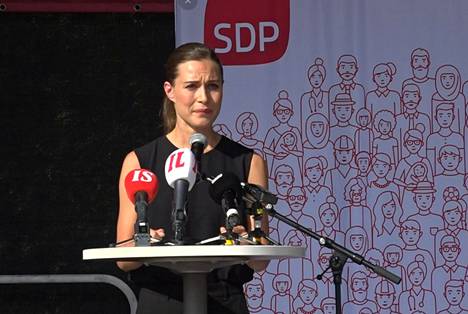
-
Ukraine Crisis
I think you and me will have to wait about 30 years before we have a reasonable view of what likely happened. It's true that only 50-100 years history usually has come to an overall conclusion and the historians are arguing about the minor details, but likely in 30 years we can see how it was.We don't really know what the motives are, there is widespread disagreement, and several narratives have come and gone about it in the Western press.
I'm completely open to speculation of essentially any plausible motive. — boethius
So your " completely open to speculation of essentially any plausible motive", yet you have decided that NATO expansion "is clearly a main driver of the hostilities and tensions". Well perhaps "a main driver" is better than "the main driver".It is clearly a main driver of the hostilities and tensions. — boethius
Well, if it was just NATO membership, Russia wouldn't be annexing parts of Ukraine. It is as simple as that you cannot deny that. You simply cannot. Regime change yes, annexation no.
By annexing territories of other sovereign countries. Right. :roll:The only prima facie interpretation of the context available is that Russia is reacting to clearly hostile moves. — boethius
We've had this discussion in this thread of what Crimea meant for Russia, how Crimea is now seen as integral part of Russia and how it is now seen by Putin an illegal act and so on.
And how about Moldova? Has it tried to join NATO? No. Yet there the same strategy was implemented: Russian/Soviet troops presented as "peacekeepers", a separatist force backed by Russia. Just like in Georgia, actually.
And how about Armenia? Has Armenia tried to be a NATO member? In fact it's a member of the CSTO. Yet when Azerbaijan attacked (with the help of Turkey and oil money), Russia didn't help it's ally, because the government had tried to make perhaps better relations to the West. It played the role of a mediator.
If your are blind to the fact that Russia wants to dominate all of it's former states and does want parts of Ukraine, if it can, then there's not much to change your view.
But this is a minor issue as the war is going on. -
Ukraine CrisisIn my view the February 24th attack was simply a gamble where the risks didn't seem so huge as prior gambles had worked.
We forget just what have been the real military victories of Russia and Soviet Union after World War 2. The really successful large military operation was in 1968 the Occupation of Czechoslovakia. Such large attack that the Czech army didn't raise it's finger and not even the Czech people dared to fight with against the tanks as had the Hungarians in 1956. There wasn't any war, just a surrender, basically protests.
(And then, the tanks were in Prague)

Similarly the occupation of Crimea, when this war actually started, was actually huge military victory. Using overwhelming force and achieving strategic surprise, all the objectives, both military and political, were met. The surprise is best shown in the World media was confused about the who were "Crimean volunteers" or the "little green men".
Yet the similar things as then were present earlier when Soviet Union invaded Finland: A puppet government "so-called Kuusinen government" that portrayed to be Finland asking the help from the Soviet Union, the idea that the Finnish workers would rejoice being liberated and earlier Civil War "reds" joining the ranks of Kuusinen's government. And the Soviet troops were said it would be an easy march and that Finnish workers would welcome them. Now we just have the "People's Republics", which have been far more successful.
Yet same thing happened as now: it hasn't been a victory march into Ukraine as it wasn't into my country.
Yet, before the assault as war is only an option, why wouldn't people under Putin tell him what he wants to hear? That it will be a short quick war and Ukraine will fold when the going gets tough.And hasn't Putin modernized the Russian military and hasn't it shown it can fight well in Syria? Who's going to say to a President that has fought very successful wars that this one will be different? -
Ukraine Crisis
Again the "Putin attacked Ukraine because of NATO-membership" argument?All just "propaganda" a literal biographer of Putin pointing out we don't know Putin's objectives? — boethius
I think everyone agrees that one single reason doesn't explain a decision to go to war and obviously Russia wouldn't like Ukraine to be a member of NATO. However this idea that this was the most important reason (or only reason) depends on the idea that Ukrainian membership was possible/realistic/imminent.
Let's notice just what actually was said before the war:
(Do note the date: before February 24th.)
(TASS, February 16th 2022) BERLIN, February 16. /TASS/. Ukraine’s NATO membership is not on the alliance’s agenda at the moment, German Chancellor Olaf Scholz told German reporters after talks with Russian President Vladimir Putin.
"There is a fact, and the fact is: all parties know that Ukraine’s NATO membership is not on the agenda," the German leader said at a news conference, broadcast by WELT.
He went on to say that in this situation "everyone should step back a bit," and spoke against "a military standoff about an issue which is not even on the agenda."
Scholz made similar statements during a joint news conference with Russian President Vladimir Putin earlier in the day.
What "not being in the alliances agenda" meant for Germany has been now cleared a bit:
(NEXTA) German @Bundeskanzler Olaf Scholz said that before the war in Ukraine began, he had promised Putin that Ukraine would not become a NATO member in the coming decades, Die Welt reports.
If Germany was against the NATO membership of Ukraine (basically openly), I guess there would be other NATO members too, which have disputes with Ukraine and willing to be in good terms with Russia and hence wouldn't want to expand the organization. But of course this hasn't silenced the people who argue that this war happened because of NATO. -
Ukraine Crisis
I'm not so sure about that. We do know something about how Russia works. Don't think it's all speculation. Starting with the US knowing that Russia would invade, there are things that are known. What Putin thinks inside his head we naturally have no idea.Again, wild speculations by Western media. — boethius -
Ukraine Crisis
But they have not. And that's the important issue here.Obviously they would make it an "official war" if they wanted to, and they've talked about doing so. — boethius
With the information we have, we can at least quite confidently say that Russian morale isn't high and Ukrainian moral isn't on the verge of collapse.Again, we don't really have any statistically relevant data on Russian troops morale ... and low-morale in armies is pretty common and often goes up and down, total collapse being a pretty big outlier.
Moreover, is Ukrainian morale any better? — boethius
Even if it is anecdotal and perhaps some reporting is biased, there's enough to understand that there are moral (and other) problems in the Russian side. That doesn't mean that all Russian units have low moral. And when it comes to Ukrainians, Russia would be eager to show of large groups of surrendering Ukrainians. We did see videos of these when Mariupol fell.
And naturally we can say that Ukrainian morale is better. They have been attacked, it's pretty simply for them. It's the Russians that can have the debate about if this war was a good idea. Many young people have voted on the issue by leaving Russia. Something that is an indicator that not everyone agrees with Putin. -
Ukraine CrisisYes, this came first apparent when Putin's own intelligence service raided the FSB headquarters responsible for Ukraine after the war had started. Likely they had told simply what Putin wanted to hear (a trap in that intelligence services can fall into).
I think we'll know the details later even better, but likely the intelligence service painted a rosy picture of this invasion just going so well as the occupation (and annexation) of Crimea. We have to remember that the most successful military operations that the Soviet Union and Russia have pulled off were so successful that they aren't called wars: The occupation of Czechoslovakia 1968 and the occupation of Crimea 2014. Hence the Russia have this urge for these armour attacks going straight to the Capital and simply eliminate the enemy leadership.
Americans call the tactic a "Thunder Run", which the US did successfully during the invasion of Iraq. When the US noticed that the Iraqis weren't putting much a fight, they just rolled the tanks right inside Baghdad into the city center. With a defender that would be willing and capable to fight, this would be a horrible strategy. And so it was in the battle of Kyiv (and earlier in the First Chechen war).
Interesting to look at the American experience in Baghdad to what now happened in Ukraine:
And how the same tactic didn't work near Kyiv. Here a large armoured column is attacked, it stops (basically bunching up dangerously together) and then it retreats:
-
Antinatalism Arguments
I had no idea that I was talking to a women.You're forgetting you're talking to a woman. — baker
I've seen studies that the diet worsened from the Early Middle Ages to the age of industrialization, but it might be too drastic to think our food now is less healthier. The 19th Century brought huge improvement to agriculture and also an emphasis on food safety requirements. Now we have the ability to eat extremely healthy food, but what actually the food we eat is another thing. The really irritating issue is that the healthy diet is far more costly than the cheapest food, which makes for a bad diet.The average peasant in the Dark Ages ate healthier food than most people do today. - Certainly no pesticides and no GMOs. In the old times, food was much healthier, much more satiating because it had real taste. — baker
And with medievel diet we have to remember it wasn't fresh, the food that could be preserved. The idea was to eat only the food from the last season, not this one as you didn't know just how the it would be this year. So a lot of salt.
I think it's far more about social assumptions than metaphysical ones.Sure. But what are the metaphysical assumptions behind them? — baker
You look to be smart when you're critical about your life and the society around you. To accept it and be happy about it seems to many like you haven't thought about the current issues. Or you simply don't care and just go "with the flock". -
Philosophy vs Science
I think this might be worth mentioning in your video, that you are using the broader meaning. It helps to avoid unnecessary criticism.This is indeed the modern meaning of "science", i.e. 17th century and onwards. But the word was used before in a broader sense. E.g. Aristotle used it as any topic that pertains to truth. — A Christian Philosophy -
Donald Trump (All General Trump Conversations Here)
Well, don't forget the Trumps then:It’s just the death throes of another establishment political dynasty. The Cheneys, the Clintons, the Bushs—all are heading towards the trash-bin of history. — NOS4A2
:focal(399x0:401x2)/donald-hillary-800-4c2497660dc844f3a6962d38eb424ffb.jpg)
-
Wading Into Trans and Gender Issues
I had that response from reading the OP, which was quite on with the lines how typically these debates go.Maybe if you'd read the thread properly, you'd see the philosophical element here. The intersection between biology/psychology/society and the primacy of identity over behaviour, preference etc. But if you're not interested, that's OK too. — Baden
And sorry if a see this issue more from the sociological / political element than philosophical, but that just happens when one brings societal questions and the society (including social behavior) into question. -
Eat the poor.
US demographics is far better, thanks to immigration.The replacement rate is low here as well. — Xtrix
And you think in those profit and non-profit organizations the managers didn't listen one iota at their workforce about anything? Nope, zero. They had their information from God (or something) and preached it to the organization without wanting to hear any feedback?Yes. Profit and non-profit. Completely beside the point, but there's an answer. — Xtrix -
Wading Into Trans and Gender Issues
Might be.It depends on the specific context. In some ways, we are very similar to animals, yes, but it's a minor side issue here anyway. — Baden
But usually these issues are more about virtue signalling than about the actual issues. So few are actually trans, for example. Some people want to be insightful and progressive, wishing to be in the minority fighting for the rights that later are accepted universally, but today are a hot potato. And other people want to be the conservatives, upholding "common reason" and decency against nonsense. And both of these types dominate the public discussion. However they may declare themselves to be open minded and wanting a discussion, they are just waiting to put you into the other camp, those who are wrong, and attack you.
Yeah, perhaps I have had enough of these stupid culture wars. -
Wading Into Trans and Gender IssuesFair enough, I haven't read all of your posts.
But I still think there's a lot of hubris in our thinking that we are sooo different from animals. Yes, having an advance language system has it's perks, but still.
ssu

Start FollowingSend a Message
- Other sites we like
- Social media
- Terms of Service
- Sign In
- Created with PlushForums
- © 2026 The Philosophy Forum
:quality(75)/cloudfront-us-east-1.images.arcpublishing.com/elcomercio/QZBVDP75ORFRZGZBUBTCVX6JF4.jfif)